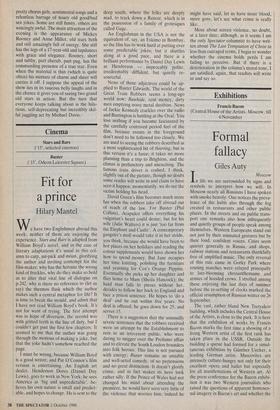Cinema
Stars and Bars (`15', selected cinemas) Buster ('15', Odeon Leicester Square)
Fit for a prince
Hilary Mantel
We have two Englishmen abroad this week; neither of them are enjoying the experience. Stars and Bars is adapted from William Boyd's novel, and in the case of literary adaptations it's usual in this col- umn to carp, nit-pick and moan, glorifying the author and inviting contempt for the film-maker: why has the heroine the wrong kind of freckles, why do they make so bold as to alter that vital line of dialogue on p.242, why is there no reference to (let us say) the thermos flask which the author makes such a central metaphor for life? It is time to break the mould, and admit that I have not read William Boyd's book. It's not for want of trying. The first attempt was in hope of diversion, the second was with gritted teeth in the line of duty, but I couldn't get past the first few chapters. It seemed to me that the author was going through the motions of making a joke. but that the joke hadn't somehow reached the page.
I must be wrong, because William Boyd is a good writer; and Pat O'Connor's film version is entertaining. An English art dealer, Henderson Dores (Daniel Day Lewis), goes to work in New York; he sees America as 'big and unpredictable', be- lieves his own nature is small and predict- able, and hopes to change. He is sent to the deep south, where the folks are deeply mad, to track down a Renoir, which is in the possession of a family of grotesques called Gage.
An Englishman in the USA is not the equivalent of, say, an Eskimo in Bombay, so the film has to work hard at putting over some predictable jokes; but it shuttles along at a good pace, and there is a brilliant performance by Daniel Day Lewis as Henderson — impeccably polite, irredeemably diffident, but quietly re- sourceful.
None of those adjectives could be ap- plied to Buster Edwards. The world of the Great Train Robbers seems a long-ago world now: Rawhide, rent money, dirty men emptying noisy metal dustbins. News of Jackie Kennedy crackles over the radio and Barrington is battling at the Oval. You lose nothing if you become fascinated by the carefully contrived period feel of the film, because events in the foreground don't need to be followed too closely. We are used to seeing the robbery described as a most sophisticated bit of thieving, but in this version it's a farce; it takes no more planning than a trip to Brighton, and the climax is perfunctory and unexciting. The famous train driver is coshed, I think, slightly out of the picture, though no doubt some reader will write in and claim to have seen it happen; momentarily, we do see the victim 'holding his head.
David Green's film becomes much more fun when the robbers take off abroad out of reach of the law. For Buster (Phil Collins), Acapulco offers everything his vulgarian's heart could desire; but for his wife (Julie Walters) it is just 'too far from the Elephant and Castle'. A contemporary gangster's moll would take it in her stride, you think, because she would have been to hot places on her holidays and reading the colour supplements would have shown her how to spend money. But Jane occupies her time knitting, polishing the furniture and yearning for Cox's Orange Pippins. Eventually she picks up her daughter and flies home to Mum (Sheila Hancock); the hard man falls to pieces without her, decides to follow her back to England and face a prison sentence. He hopes to `do a deal' and be . out within five years. No deal is offered; he goes down for 25, and serves 15.
There is a suggestion that the unusually severe sentences that the robbers received were an attempt by the Establishment to rein in an irreverent public, who were daring to snigger over the Profumo affair and to elevate the South London bounders into folk heroes. This line is not pursued
with energy; Buster remains an amiable and well-acted comedy, of no pretensions
and no great distinction. It doesn't glorify crime, and in fact makes its hero look rather silly. If the Prince of Wales had not changed his mind about attending the premiere, he would have seen very little of the violence that worries him; indeed he might have said, let us have more blood, more gore, let's see what crime is really like.
More about screen violence, no doubt, at a later date; although, as it seems 1 am the only Spectator columnist to have writ- ten about The Last Temptation of Christ in less than outraged terms, I begin to wonder whether the cinema holds perils I am failing to perceive. But if there is a deterioration in the column's moral tone, I am satisfied, again, that readers will write in and say so.


































































 Previous page
Previous page